Turning points: Syria and the Russian diplomacy. Stalingrad syndrome.
“Damascus is the “Stalingrad” of Russian diplomacy. After years of geopolitical withdrawal, Moscow has chosen Syria as a way to revive its image of power in the world. “Not one step back” is the Kremlin’s new strategy, as it was for the Red Army along the banks of the Volga river during World War II. To be more convincing, the Kremlin has simultaneously flexed its muscles by supplying sophisticated […]
Полное исчерпание Резервного фонда в 2017 году.
12 Dec 2016Председатель Счетной палаты Татьяна Голикова предупредила, что денег в Резервном фонде в 2017 году не останется, и тогда правительству придется использовать средства Фонда национального благосостояния. В качестве положительного момента она отметила тот факт, что пользоваться резервными средствами для покрытия бюджетного дефицита планируется меньше…
МК – Московский Комсомолец
Сайт “Мемориала” со списком сотрудников НКВД.
24 Nov 2016 Сайт правозащитной организации “Мемориал”, на котором были опубликованы данные около 40 тысяч сотрудников НКВД эпохи “большого террора”, временно недоступен из-за большого количества обращений. 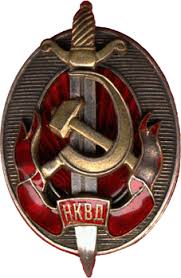
Справочник “Кадровый состав органов государственной безопасности СССР. 1935-1939” выложен на сайт “Мемориала” 23 ноября.
В справочнике представлены краткие данные о 39 тысячах 950 сотрудниках НКВД, получивших специальные звания системы госбезопасности с момента их введения в 1935 году до начала 1941 года.
“Конгресс интеллигенции” начал сбор подписей под письмом, призывающим «остановить попытку государственного переворота». Речь в нем идет о преспективе принятия единой государственной идеологии РФ. Высказать свое мнение по поводу письма и подписаться под ним можно на сайте КИ. Подписи под обращением поставили писатели Людмила Улицкая, Светлана Алексиевич, Владимир Войнович, сестра Михаила Прохорова, общественный деятель Ирина Прохорова, известные правозащитники.
Алексей Улюкаев арестован.
15 Nov 2016 Президент России освободил министра экономического развития Алексея Улюкаева от должности в связи с утратой доверия. 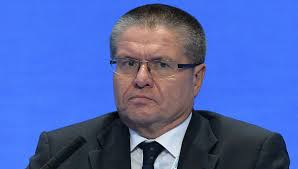
Премьер-министр России Дмитрий Медведев уже назвал арест главы минэкономразвития Алексея Улюкаева “тяжелым событием” для властей и потребовал провести тщательное расследование в связи с обвинениями в адрес министра.
По данным следствия, Улюкаев получил взятку в 2 млн долларов от компании “Роснефть” за положительное заключение и оценку сделки по приобретению государственного пакета акций “Башнефти”.
Месяц назад “Роснефть” сообщила, что заключила договор купли-продажи акций государственного пакета акций АНК “Башнефть” и “полностью выполнила свои обязательства по договору, перечислив 329,7 млрд рублей на счет федерального казначейства”.
Более половины россиян – 57% – считают, что русские – великий народ, имеющий особое значение в мировой истории, свидетельствует опрос, опубликованный “Левада-центром”.
Еще больше опрошенных – 76% – считают Россию великой державой и видят миссию страны в сохранении этого статуса.
Верховная Рада приняла совместную с Польшей декларацию об ответственности СССР за начало войны.
20 Oct 2016Украинский парламент принял Декларацию памяти и солидарности сейма Республики Польша и Верховной Рады Украины по событиям Второй мировой войны. Об этом говорится в сообщении, опубликованном на сайте украинского парламента.
Ранее планировалось принятие декларации парламентами трех стран – Украины, Польши и Литвы. Однако из текста было исключено упоминание о сейме Литвы в связи с формированием в этой стране нового состава парламента, передает “Интерфакс”.
В декларации отмечается “великая историческая жертва народов Польши и Украины ради защиты свободы и независимости“. “Представители сейма Республики Польша и Верховной Рады Украины совместно и одновременно принимают эту Декларацию памяти и солидарности, чтобы почтить память миллионов жертв, которые понесли наши народы во время Второй мировой войны, и осудить внешних агрессоров, которые пытались уничтожить нашу независимость”, – говорится в документе. 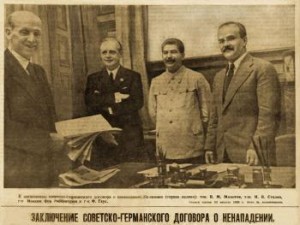
Ответственность за начало Второй мировой войны в декларации возлагается на нацистскую Германию и Советский Союз. По мнению авторов документа, пакт Молотова – Риббентропа, заключенный в 1939 году “между двумя тоталитарными режимами – коммунистическим Советским Союзом и нацистской Германией”, “привел к взрыву 1 сентября Второй мировой войны, вызванной агрессией Германии, к которой 17 сентября присоединился Советский Союз“.
“Следствием этих событий была оккупация Польши Германией и Советским Союзом и массовые репрессии против наших народов. Те события привели также к принятию в Ялте в 1945 году решений, которые начали новый этап порабощения всей Восточной и Центральной Европы, длившийся полвека”, говорится в декларации.
Памятник русскому царю установлен на набережной рядом с Богоявленским собором, у слияния рек Оки и Орлика, где в 1566 году по приказу Ивана Грозного был основан Орел. 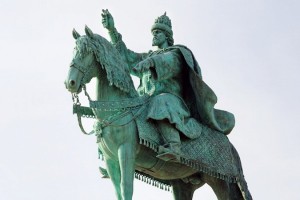
Приветствие в связи с открытием памятника жителям города прислал министр культуры РФ, председатель Российского военно-исторического общества Владимир Мединский. В обращении, распространенном РВИО, которое приводится на сайте областного правительства, он заявил, что установка монумента Ивану Грозному в Орле – это “не только дань памяти царю и воину, но и признание преемственности всех этапов нашей истории”.
“Иван IV Грозный – одна из наиболее противоречивых и вместе с тем выдающихся фигур отечественной истории. За годы своего правления он сумел предпринять ряд смелых и решительных шагов, направленных на укрепление единства Русского государства. При нем была проведена административная реформа, учреждены новые правительственные органы, создано профессиональное войско и издана первая русская печатная книга”, – написал Мединский.
Первоначально монумент планировалось установить еще 3 августа напротив детского театра в честь 450-летия города. Однако против возведения памятника выступили местные жители. Активисты протестовали против установки памятника такой неоднозначной исторической личности.
Крепость Орел была основана в 1566 году по указанию Ивана Грозного для охраны южных границ, этот год официально считается датой основания города, о чем свидетельствует запись о событии в Никоновской летописи.
… “Стороны отработают совместные действия по обороне кораблей на якорной стоянке, действия по поиску, спасению и конвоированию судов, освобождению захваченного судна, обнаружению и опознаванию целей совместной ПВО“, – сообщил представитель пресс-службы Восточного военного округа по Тихоокеанскому флоту Владимир Матвеев.
Во время учений планируется также нанести совместные ракетно-артиллерийские удары по морским целям, а затем осуществить совместную высадку морского и воздушного десантов на условно захваченный остров…
Deutsche Welle 12.09.2016
“The Warsaw summit is of breakthrough significance. Our message to NATO from the very beginning was clear: in the face of the changing situation in the security environment in our part of the world, in Central and Eastern Europe it is necessary to strengthen the presence and potential of NATO,” President Andrzej Duda has said an interview ahead of a Warsaw summit of the military alliance. “We have said from the outset that there is a need to strengthen the Baltic states and strengthen Poland in these terms through the presence of NATO forces in nations in Central and Eastern Europe.” 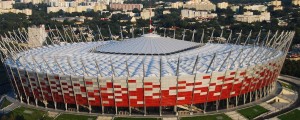
Asked if four battalions of a thousand soldiers each in Poland and the Baltic countries would be enough to deter Russia, Duda said: “This is above all a clear signal what the intentions of the Alliance are. “It is above all a clear signal that the Alliance is tightly-knit, that the Alliance is effective, that the Alliance is able to make decisions and, above all, that it is cohesive, it is together, that it shows solidarity, that we are reacting to what is happening…
“One thing is the most important: that anyone who carries out an act of aggression on a country in which there are NATO troops will at the same time be carrying out an act of aggression on all countries.”
“The security situation in Europe has significantly deteriorated,” Mrs Angela Merkel told the German parliament. “Russia’s actions have deeply disturbed our eastern allies. They therefore require clear reassurance from the alliance.” NATO is expected to approve plans to send four combat battalions of around 1,000 troops to each of Poland, Lithuania, Latvia and Estonia at the Warsaw summit. “If international law and the basic principle of the inviolability of borders are put in question by word and deed, then of course trust is lost,” Mrs Merkel said.
Secretary General Jens Stoltenberg said Allied leaders will take key decisions to strengthen the Alliance’s defence and deterrence and project stability beyond NATO’s borders.
Since the Alliance’s last summit in September 2014 in Wales, NATO has implemented the biggest reinforcement of its collective defence since the Cold War. “We delivered a faster, a stronger, and a more ready Alliance”, Mr Stoltenberg told a press conference at NATO headquarters. “We now need to take the next steps. So at our Summit in Warsaw, we will agree to further enhance our military presence in the eastern part of the Alliance.”
The Secretary General said that Allied leaders will agree to deploy four robust, multinational battalions to Estonia, Latvia, Lithuania and Poland. Further efforts to strengthen the Alliance’s deterrence and defence include a tailored presence in the south-east, based on a multinational brigade in Romania and steps to improve cyber-defence, civil preparedness and the ability to defend against ballistic missile attacks.
The US wants other members in the alliance to share the burden of military spending. NATO wants its members to try to spend 2 percent of their GDP on defense. Many members will want to revise this system in Warsaw as it does not reflect the contribution of each country
Mr Stoltenberg said preparations for holding another meeting of the NATO-Russia Council shortly after the Warsaw Summit are ongoing. “We remain open to dialogue with Russia. The NATO-Russia Council has an important role to play as a forum for dialogue and information exchange, to reduce tensions and increase predictability,” Stoltenberg said.
The Pope coming back from Armenia.
27 Jun 2016Pope Francis spoke on the Armenian genocide and Britain’s vote to leave the European Union, as well as a host of other topics in a wide-ranging press conference on his flight back to Rome following his Apostolic Voyage to Armenia.
Sunday’s in-flight press conference began with questions about the Apostolic Voyage to Armenia that Pope Francis had just concluded.
Asked about his message for Armenia for the future, the Holy Father spoke about his hopes and prayers for justice and peace, and his encouragement that leaders are working to that end. In particular, he talked of the work of reconciliation with Turkey and with Azerbaijan. The Pope will be travelling to Azerbaijani later this year. 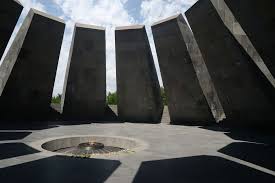
Pope Francis also spoke about his use of the word ‘genocide,’ acknowledging the legal import of the expression, but explaining that this was the term commonly in use in Argentina for the massacre of Armenians during the first World War.
About the Pan-Orthodox Council, which concluded Sunday in Crete, the Pope said, “A step was made forward . . . I think the result was positive.” In response to a question about upcoming commemorations of the 500th anniversary of the Protestant “Reformation,” Pope Francis said, “I think perhaps this is also the right moment for us not only to remember the wounds on both sides, but also to recognize the gifts of the Reformation.” He also had words of praise for Martin Luther. The Pope praying and working together are important for fostering unity.
Reporters also questioned the Pope about recent events, including the recent “Brexit” vote in Britain. He said he had not had time to study the reasons for the British vote to leave the European Union, but noted that the vote showed “divisions,” which could also be seen in other countries. “Fraternity is better, and bridges are better than walls,” he said, but he acknowledged that there are “different ways of unity.” Creativity and fruitfulness are two key words for the European Union as it faces new challenges.
Finally, answering a question from Father Federico Lombardi, SJ, the Director of the Holy See Press Office, Pope Francis reflected on his visit to the Memorial at Tzitzernakaberd, and his upcoming journey to Poland, which will include a visit to Auschwitz. The Pope said that in such places, he likes to reflect silently, “alone,” praying that the Lord might grant him “the grace of crying.”
Extract from the Vatican Radio.
Welcome
We are a group of long experienced European journalists and intellectuals interested in international politics and culture. We would like to exchange our opinion on new Europe and Russia.
Categories
- Breaking News (11)
- CIS (129)
- Climate (2)
- Energy&Economy (115)
- EU Eastern Dimension (85)
- Euro 2012 – Sochi 2014 – World Cup 2018, Sport (43)
- Euro-Integration (135)
- History Culture (198)
- International Policy (261)
- Military (74)
- Interviews (18)
- Italy – Italia – Suisse (47)
- Odd Enough (10)
- Poland and Baltic States (126)
- Religion (31)
- Russia (421)
- Survey (4)
- Turning points (4)
- Ukraine (176)
- Российские страницы (113)
Archives
- November 2020
- October 2020
- September 2020
- August 2020
- July 2020
- May 2020
- April 2020
- March 2020
- January 2020
- December 2019
- November 2019
- October 2019
- September 2019
- August 2019
- July 2019
- June 2019
- May 2019
- April 2019
- March 2019
- February 2019
- December 2018
- November 2018
- October 2018
- September 2018
- August 2018
- July 2018
- June 2018
- May 2018
- April 2018
- March 2018
- February 2018
- January 2018
- December 2017
- November 2017
- October 2017
- September 2017
- August 2017
- July 2017
- May 2017
- March 2017
- January 2017
- December 2016
- November 2016
- October 2016
- September 2016
- July 2016
- June 2016
- May 2016
- April 2016
- February 2016
- January 2016
- November 2015
- October 2015
- September 2015
- June 2015
- April 2015
- March 2015
- February 2015
- January 2015
- December 2014
- November 2014
- October 2014
- September 2014
- August 2014
- July 2014
- June 2014
- May 2014
- April 2014
- March 2014
- February 2014
- January 2014
- December 2013
- November 2013
- October 2013
- September 2013
- August 2013
- July 2013
- June 2013
- May 2013
- April 2013
- March 2013
- February 2013
- January 2013
- December 2012
- November 2012
- October 2012
- September 2012
- August 2012
- July 2012
- June 2012
- May 2012
- April 2012
- March 2012
- February 2012
- January 2012
- December 2011
- November 2011
- October 2011
- September 2011
- August 2011
- July 2011
- June 2011
- May 2011
- April 2011
- March 2011
- February 2011
- January 2011
- December 2010
- November 2010
- October 2010
- September 2010
- August 2010
- July 2010
- June 2010
- May 2010
- April 2010
- March 2010
- February 2010
- January 2010
- December 2009
- November 2009
- October 2009
- September 2009
- August 2009
Our books




